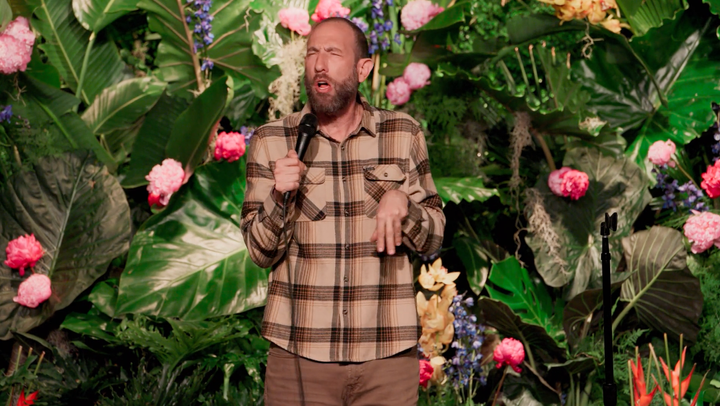Bad Things
Are They Bad? Should People Do Them? Let's Find Out!

Hello: thank you for reading Humorism. If you can, please help keep this newsletter going by updating your subscription for six bucks a month:
There's this vexing thing that happens whenever someone like Joe Rogan does awful shit that becomes the subject of prolonged controversy, where basically the right turns it into an all-out war over democracy and the center-to-left responds by turning it into Something Serious And Real That Normal People Care About so the right can't say they're trying to censor a comedian. In this case, broadly speaking, the right saw a totally reasonable backlash to Joe Rogan's anti-vaccine bullshit and melted down over left-wing authoritarianism; the left saw this meltdown and turned the reasonable backlash into an equally reasonable but adjacent conflict over Spotify’s reprehensible treatment of recording artists; and the center sprung for a nuanced debate over Spotify’s content moderation obligations as a platform-turned-publisher.
This is all mumbo-jumbo. These controversies are almost always about very elementary questions any child could answer. The left should not give in to the temptation to anticipate the right’s attacks, nor the center’s obfuscations, by avoiding those questions. The questions I refer to are these: should people do good things or bad things? Should they be good people or bad people?
These are simplistic framings, but sometimes simplicity is appropriate. Consider Joe Rogan, a famous man who uses his fame to sow doubts about life-saving vaccines during a pandemic, to spread transphobia, and to say racist shit. These are bad things. One should not do them. They put people in danger. They make the world worse. To do these things, bad things, over and over again, against the clearly articulated wishes of the people they harm, is to be a bad person. If you run a platform that pays and profits off these people, well, guess what—that’s bad too. Congrats on all the money.
There is no law against being a bad person, of course, just as there is no law against saying bad things. This is as it should be. Everyone is allowed to be a piece of shit (…within certain parameters). That does not mean one should be a piece of shit. Let’s remember our Kant here: would the world function particularly well if everyone were a piece of shit? No, it wouldn’t function well at all. But again, there’s no law against it. The only forces available to regulate pieces of shit are economic and social ones, which is also as it should be. You shouldn’t go to prison for being a bad person, but you should find it generally more difficult to accomplish your goals.
CW: Multiple clips of Joe Rogan saying the N-word.
— PatriotTakes 🇺🇸 (@patriottakes) January 30, 2022
This is who the right is defending. pic.twitter.com/qqaB12dFYz
This is not illiberalism. It is, in fact, one of the great projects of liberalism. How do we create a society free of hatred in which people are free to be hateful? On the one hand, ideally, by building various equities into the fabric of that society. On the other hand—or, more realistically, in the absence of the first—by coming together as citizens to make clear that if you do that shit, you're gonna have a bad fucking time. Everyone has the right to be transphobic; no transphobe has the right to move frictionlessly through public spheres. I know the left generally doesn’t care to be associated with anything that could be described as “cancel culture” anymore, but I maintain that exacting clear social and professional costs for high-profile (e.g.) bigotry is a worthy effort, one that is by no means mutually exclusive with every other worthy effort. If we don’t enforce baseline social norms that discourage these things, we cede the playing field to reactionaries trying to make these things the norm.
It’s fashionable for cynics on the left to argue that whatever problems might stem from individual bad actors are dwarfed by the systemic problems those bad actors represent: the issue isn’t Rogan, it’s that millions of people take him seriously. These arguments describe a fantasy world where influential people are not responsible for their actions, even though the people they influence are responsible for theirs, except in the versions of the argument where they’re not, because they’re just hapless victims of structural forces controlled by nobody in particular. (Confusingly, the people making these arguments also tend to live in a fantasy world where the size of a bad person's audience is proof of his legitimacy; never mind all of human history.) This is where it’s useful to boil the controversy down to those simple questions. In a world where people are simultaneously distrusting of conventional authorities and too trusting of unconventional authorities, should those unconventional authorities do bad things? No, obviously not. If millions of people take you, an idiot, more seriously than experts, this makes it much worse for you to keep being an idiot! Don’t do it!
I understand that I’m largely preaching to the choir here—and probably repeating past newsletters in which I also preached to the choir—but I really, really, really think it’s important to be clear about these issues. I fully support the effort to leverage the Rogan controversy into a larger push for streaming platforms to pay artists fairly. What I resist is the impulse to downplay the Rogan of it all. The fundamental problem isn’t one of free speech, political correctness, democratic values, or any of the usual smokescreens. It’s that the guy does bad things on a huge platform.
I want to live in a society that provides strong, non-carceral disincentives to doing bad things. I want a comedy industry that discourages people from doing harm, not one that celebrates and protects harm-doers. These are fine, normal goals we should all feel comfortable pursuing by the only means available to (most of) us: our own voices and wallets. It’s true that the underlying systemic problems are larger than any individual, but you and I do not have the power to pass and enforce legislation. We can only do what we can do, we can only do it one step at a time, and frankly most of us stand a much better chance of shaming a podcaster into shutting up about vaccines and trans people than we do of dismantling the empire. Which, you know, sucks, but bad things are not made acceptable by the existence of worse things.
Right-wingers elevate these arguments into abstractions because they otherwise would have to advocate for their actual goals—the bad things, codified by law—while the center is too in bed with the right to call bad things what they really are. The left has no reason to follow them from straightforward moral questions to stupid academic debates, nor to switch out those questions for seemingly less controversial ones. This is easy. Anti-vaccine propaganda is bad, so is transphobia, so is racism. If you traffic in all that shit, fuck you, get lost, it’s my most basic duty as a human being to do whatever I can to stop you. What else is there to discuss?
Header image via YouTube.


